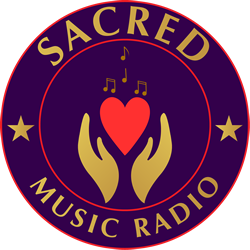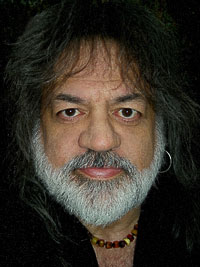Rev. Andras Corban Arthen is the spiritual director of the EarthSpirit Community, a religious and educational organization dedicated to the preservation of Earth-centered spirituality, particularly the indigenous European traditions; he is also president of the European Congress of Ethnic Religions, and serves on the board of advisors of the Ecospirituality Foundation. He has been a presenter at many interfaith events, including the 1993, 2004, and 2009 Parliaments, and the 2007 World Interreligious Encounter.
Sacred Music Radio was fortunate to sit down with Andras Corban Arthen and discuss his work and the importance of music within paganism.
1) Andras Corban Arthen, Could you give us some background on yourself?
I am originally from Galiza, in the northwest of Spain. I was raised in Spain, as well as in the Caribbean, but I’ve spent most of my life in the United States. I live as part of an intentional community in Glenwood, a small working farm situated in the middle of a forest, in the Berkshire Hills at the western end of the state of Massachusetts. I am the spiritual director of The EarthSpirit Community, an Earth-centred group which I founded back in 1977. I am currently a Vice-Chair of the Parliament of the World’s Religions, one of the oldest and largest interfaith organizations, which hosts events in various parts of the world that bring together anywhere from 7,000-10,000 people from all religions and spiritual paths to explore ways to find mutual respect and understanding so that, together, we can help address some of the world’s greatest problems. And I am president of the European Congress of Ethnic Religions, an organization which was founded in Lithuania in 1998 to promote the preservation and restoration of the pre-Christian indigenous religions of Europe.
2) For our listeners that don’t know as much about Earth centered spirituality, could you give us a bit more information?
Earth-centered spirituality refers to religious or spiritual traditions whose teachings and practices have evolved from a direct communion with the natural world. A lot of these traditions focus more on experiential approaches to the Sacred – including animism and mysticism – instead of emphasizing religious dogma or revealed scriptures. They often are tribal or communitarian in structure. The best and most accessible examples of Earth-centered spirituality can be found among indigenous peoples around the world.
3) What work do you do with EarthSpirit Community?
A big part of my role in EarthSpirit is to do outreach work on behalf of the organization. I travel a good deal, teaching, lecturing, engaging in interreligious dialogue, attending various conferences, giving interviews, developing connections with like-minded communities and organizations, etc. My work with the Parliament of the World’s Religions, and with the European Congress of Ethnic Religions, is a direct extension of the work I do on behalf of EarthSpirit. In addition to this, within EarthSpirit I also help to lead ceremonies, conduct rites of passage, perform legal handfastings (pagan weddings), provide spiritual counseling to members, and help organize our various events.
4) Through your work with MotherTongue, which brings together vocal and instrumental music, you have witnessed first hand the impact music can have. How important do you, Andras Corban Arthen, feel music is in bring together people of different faiths?
I think that it is, in fact, one of the most important and effective ways to bring together people of different religions. Music is a universal language, and because it is so familiar and so accessible, it can easily break down whatever walls of fear and prejudice may exist among people. This was brought home very powerfully to us at the 1993 Parliament of the World’s Religions in Chicago, where pagans made our first significant appearance before the global interreligious community. The term “pagan,” of course, has long been burdened with negative connotations, the result of prejudices and misconceptions which have existed for centuries. We knew that a lot of people at the Parliament would have misgivings regarding our presence there, and we went prepared with workshops, panel discussions, literature to hand out, and so on; but we still encountered a good bit of resistance and wariness. Then MotherTongue performed a concert of pagan sacred music – some of it traditional, some original – which also included stories, poetry, dance, costumes; in short, all of the elements of a religious ritual, but presented as a performance. The response far surpassed our wildest expectations: people of all faiths joined in the chants, danced in the aisles, and many came up to us afterwards with tears in their eyes, to tell us how much the music had moved them, how it had reached them deep inside and awakened in them a clear understanding of who we were, of what our spiritual traditions were about. In the space of an hour-and-a-half, prejudice was shattered and replaced with joy, with acceptance, with respect; and from that point forward, every single presentation at the Parliament was standing-room only.
5) In 1991, you worked as representation of the indigenous European traditions at the United Nation interfaith conference on Religion and Prejudice- do you feel that has been much improvement or development in this area since?
Without a doubt. The high point of that conference, for me, was when the panelist representing Christianity openly stated that the best thing Christians could do, as their contribution to a dialogue on how religion can help eliminate prejudice, was simply to be silent and to listen. Christianity, he said, was responsible for much of the religious-based prejudice found in the world, so he suggested that Christians should listen, for a change, to some of the victims of that prejudice – particularly indigenous peoples and pagans – in order to understand the extent of the harm that has been done in the name of their religion, and then, to ask forgiveness and seek to make reparations to those who are still being victimized. I have spent forty years spreading the awareness – especially throughout the interreligious movement – that the various traditions which came to be labeled “pagan” actually represented the indigenous cultures and religions of Europe; that they endured atrocities similar to those suffered by indigenous peoples in other lands; and to underscore the fact that some of those traditions have nevertheless managed to survive into the present. In 1993, the first modern Parliament of the World’s Religions was held, and the Parliament, as one of the foundational organizations of the global interfaith community, has helped create an environment where that message could be heard and heeded. As a result, entities such as the European Congress of Ethnic Religions have been formed to preserve and to foster what little has survived of the indigenous European traditions, and to develop bonds of solidarity with other indigenous communities and organizations throughout the world. Just judging from the increasing number of invitations I’ve been receiving to speak and teach about this subject, I’d say that there’s definitely a growing awareness and interest about it.
6) What was the most moving part of the 2015 Parliament of World Religion at Salt Lake City?
There were two things in particular which were extremely meaningful for me. On the one hand, I was deeply moved to see my son and my daughter – who are in their twenties – play a central role in organizing and managing the Parliament’s program for young people. They both attended the first modern Parliament in 1993 when they were very young children, and it has remained an important part of their lives as they have grown up. They have participated in the young people’s program several times, speaking and performing at plenaries, offering workshops, taking part in panels, and so on. To see them this time in positions of leadership, giving back to younger people some of the things they have learned and done over the years, made me feel incredibly proud of them. On the other hand, I was very grateful to be invited, along with my dear friend Inija Trinkuniene – who is the krive (supreme priestess) of the Romuva religion of Lithuania – to speak on behalf of the indigenous religions of Europe as part of the Parliament’s Indigenous Plenary. The spontaneous, wildly enthusiastic response we received from the thousands of people in attendance, as well as the words of welcome and kinship expressed by many of the indigenous speakers, were profoundly rewarding.
7) Andras Corban Arthen, Does music play an important role in Paganism?
Yes, it does. Among neopagans, for example, the evolution of original sacred chants back in the late seventies and early eighties revolutionized the pagan movement: it created a form of universal pagan “liturgy” that enabled people coming from very different paths to experience common ground with one another. Among traditional European pagans, the sacred songs have, in many places, been the key thing which allowed the traditions to endure, even through centuries of Christian religious colonization and acculturation. In Lithuania, for instance, there are thousands of polyphonic dainos which go back to pre-Christian times, and which have been used to transmit the traditional spiritual teachings from one generation to another until the present time.
8) Many believe that the old religions disappeared after Christianity- how do you, Andras Corban Arthen, explain the continuation of paganism?
Because Christianity has had such a major influence over almost all of Western culture, there is a widespread sense that, once a country officially adopted Christianity, all of its citizens became Christians. Although that has mostly been true, it has not been entirely the case. Pockets of indigenous forms of paganism can still be found throughout Europe, mostly in remote rural places where certain conditions exist which have aided their survival. Some of these factors can include, for example, a deeply-rooted ethnic identity; localized anti-Christian sentiments resulting from a variety of reasons; the preservation of the ancestral ethnic language in counterpoint to the official language of that country; an identification of the pagan religion with a strong sense of nationalism and with physical features of the land; the thorough integration of the spiritual practices into the fabric of everyday life, which can render the religion invisible; wariness and secrecy toward outsiders; and political, social, or economic upheavals which have diverted attention from the surviving religion toward more presssing matters. I have spent four decades looking for some of these survivals, and have found a number of them in places ranging from the Gaelic-speaking parts of the Scottish Highlands, to Brittany, Euskal Herria, Lithuania, Latvia, and several of the Slavic countries of Eastern Europe. I am currently working to finish a book detailing my search for indigenous European pagan survivals.



